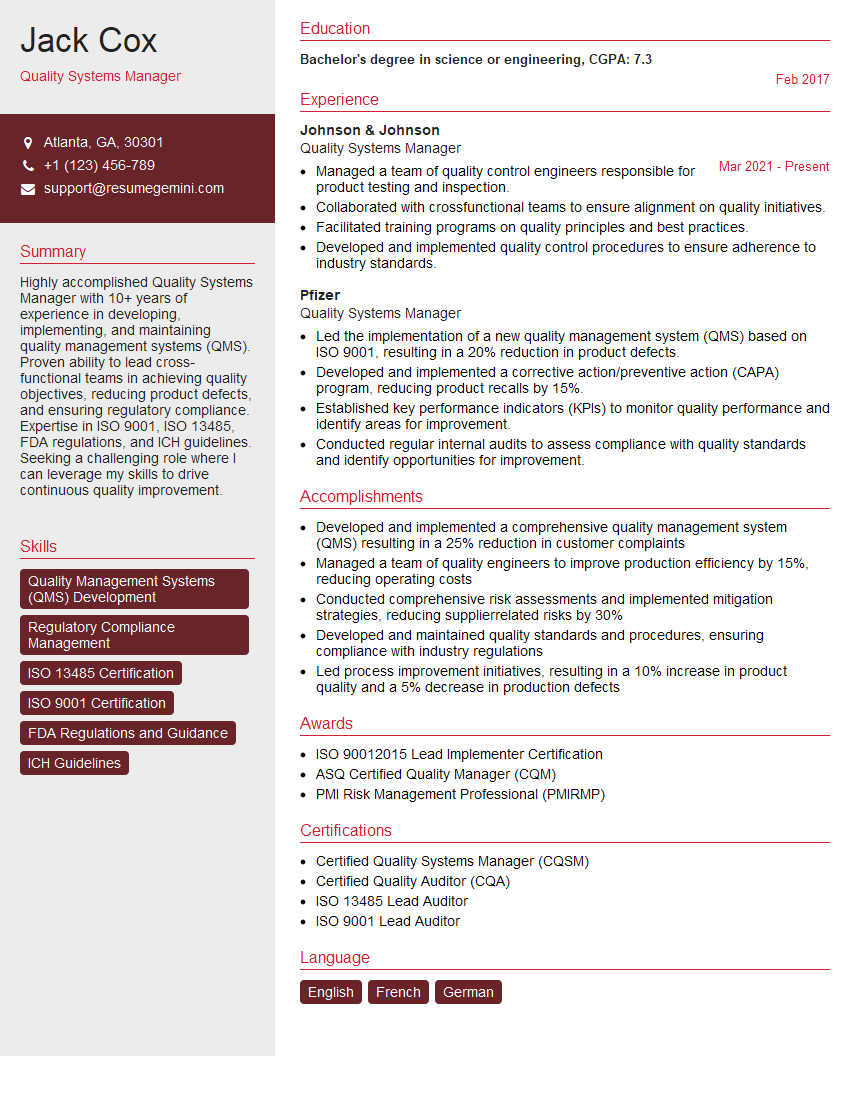Are you a seasoned Quality Systems Manager seeking a new career path? Discover our professionally built Quality Systems Manager Resume Template. This time-saving tool provides a solid foundation for your job search. Simply click “Edit Resume” to customize it with your unique experiences and achievements. Customize fonts and colors to match your personal style and increase your chances of landing your dream job. Explore more Resume Templates for additional options.

Jack Cox
Quality Systems Manager
Summary
Highly accomplished Quality Systems Manager with 10+ years of experience in developing, implementing, and maintaining quality management systems (QMS). Proven ability to lead cross-functional teams in achieving quality objectives, reducing product defects, and ensuring regulatory compliance. Expertise in ISO 9001, ISO 13485, FDA regulations, and ICH guidelines. Seeking a challenging role where I can leverage my skills to drive continuous quality improvement.
Education
Bachelor’s degree in science or engineering
February 2017
Skills
- Quality Management Systems (QMS) Development
- Regulatory Compliance Management
- ISO 13485 Certification
- ISO 9001 Certification
- FDA Regulations and Guidance
- ICH Guidelines
Work Experience
Quality Systems Manager
- Managed a team of quality control engineers responsible for product testing and inspection.
- Collaborated with crossfunctional teams to ensure alignment on quality initiatives.
- Facilitated training programs on quality principles and best practices.
- Developed and implemented quality control procedures to ensure adherence to industry standards.
Quality Systems Manager
- Led the implementation of a new quality management system (QMS) based on ISO 9001, resulting in a 20% reduction in product defects.
- Developed and implemented a corrective action/preventive action (CAPA) program, reducing product recalls by 15%.
- Established key performance indicators (KPIs) to monitor quality performance and identify areas for improvement.
- Conducted regular internal audits to assess compliance with quality standards and identify opportunities for improvement.
Accomplishments
- Developed and implemented a comprehensive quality management system (QMS) resulting in a 25% reduction in customer complaints
- Managed a team of quality engineers to improve production efficiency by 15%, reducing operating costs
- Conducted comprehensive risk assessments and implemented mitigation strategies, reducing supplierrelated risks by 30%
- Developed and maintained quality standards and procedures, ensuring compliance with industry regulations
- Led process improvement initiatives, resulting in a 10% increase in product quality and a 5% decrease in production defects
Awards
- ISO 90012015 Lead Implementer Certification
- ASQ Certified Quality Manager (CQM)
- PMI Risk Management Professional (PMIRMP)
Certificates
- Certified Quality Systems Manager (CQSM)
- Certified Quality Auditor (CQA)
- ISO 13485 Lead Auditor
- ISO 9001 Lead Auditor
Career Expert Tips:
- Select the ideal resume template to showcase your professional experience effectively.
- Master the art of resume writing to highlight your unique qualifications and achievements.
- Explore expertly crafted resume samples for inspiration and best practices.
- Build your best resume for free this new year with ResumeGemini. Enjoy exclusive discounts on ATS optimized resume templates.
How To Write Resume For Quality Systems Manager
- Highlight your experience in developing and implementing QMS based on ISO 9001 and other relevant standards.
- Quantify your accomplishments with specific metrics, such as reduction in defects or recalls.
- Demonstrate your understanding of regulatory requirements, such as FDA regulations and ICH guidelines.
- Showcase your ability to lead and manage a team of quality control engineers.
- Emphasize your communication and interpersonal skills, as you will need to work closely with cross-functional teams.
Essential Experience Highlights for a Strong Quality Systems Manager Resume
- Develop and implement comprehensive QMS based on industry standards and regulatory requirements.
- Lead CAPA program to identify, investigate, and resolve quality issues, reducing product recalls.
- Establish and monitor KPIs to track quality performance and drive improvement initiatives.
- Conduct internal audits to assess compliance and identify areas for improvement.
- Manage a team of quality control engineers responsible for product testing and inspection.
- Collaborate with cross-functional teams to ensure alignment on quality initiatives and best practices.
- Develop and deliver training programs on quality principles and industry regulations.
Frequently Asked Questions (FAQ’s) For Quality Systems Manager
What is the role of a Quality Systems Manager?
A Quality Systems Manager is responsible for developing, implementing, and maintaining quality management systems (QMS) to ensure that products and services meet customer requirements and regulatory standards.
What are the key skills required for a Quality Systems Manager?
Key skills include knowledge of quality management principles and standards (e.g., ISO 9001, ISO 13485), regulatory compliance, project management, and leadership.
What are the career prospects for a Quality Systems Manager?
Quality Systems Managers can advance to senior management roles, such as Quality Assurance Director or Vice President of Quality.
What is the average salary for a Quality Systems Manager?
The average salary for a Quality Systems Manager varies depending on experience, location, and industry, but typically falls within the range of $80,000-$120,000 per year.
What are the challenges faced by Quality Systems Managers?
Challenges include keeping up with evolving regulatory requirements, managing complex quality systems, and ensuring that products and services meet customer expectations.
What are the top certifications for Quality Systems Managers?
Top certifications include Certified Quality Manager (CQM), Certified Quality Auditor (CQA), and ISO 9001 Lead Auditor.
What are the key trends in the field of quality management?
Key trends include the increasing use of technology, such as artificial intelligence (AI) and machine learning (ML), to improve quality processes.